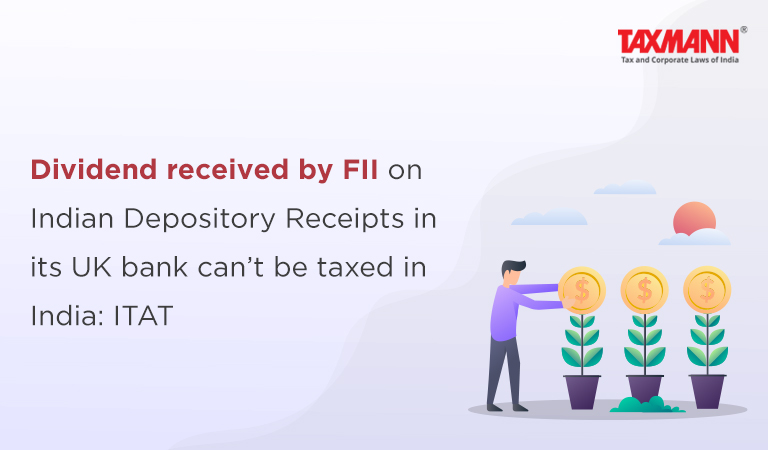Dividend received by FII on Indian Depository Receipts in its UK bank can’t be taxed in India: ITAT
- Blog|News|International Tax|
- 2 Min Read
- By Taxmann
- |
- Last Updated on 23 January, 2023

Case Details: Barclays Capital Mauritius Ltd. v. ACIT - [2023] 146 taxmann.com 134 (Mumbai-Trib.)
Judiciary and Counsel Details
-
- Vikas Awasthy, Judicial Member & Gagan Goyal, Accountant Member
- Nishant Thakkar, Adv., Ms Jasmin Amalsadvala & Harshit Sangoi for the Appellant.
- Milind S. Chavan & Nihar Samal for the Respondent.
Facts of the Case
Assessee-FII based in Mauritius was carrying on investment activities in the Indian capital market. The assessee claimed that the dividends received on equity shares from SC Plc UK, which was first distributed to an overseas custodian bank and then transferred to a domestic depository in foreign currency before being transferred to the assessee’s bank account in Indian INR.
Dividends on IDRs declared by SC Plc, should be considered as income from a foreign company (SC Plc) and paid abroad. Hence, it was income that was accruing or arising outside India.
ITAT Held
However, the Assessing Officer (AO) held that the dividend received by the assessee was taxable under the provisions of the Act as well as under article -10 of the India-Mauritius treaty. Aggrieved-assessee filed the instant appeal before the Tribunal.
The Tribunal followed the view taken in the case Morgan Stanley Mauritius Co. Ltd. [2021] 127 taxmann.com 506 (Mum.-Trib.). Tribunal held that insofar as the fact that dividend income is received by assessee in India is not in dispute, the findings of authorities below cannot be faulted in holding that the money received by the assessee from the Indian depository in respect of dividend paid by bank Plc UK is taxable in India.
Further, as per Article 10 of the Indo-Mauritius tax treaty, it is clear that dividend being paid “by a company which is resident of a Contracting State” to the resident of the other Contracting State is a sine qua non for application of Article 10.
In the given case, the dividends can be treated as having been paid either by the SCB-UK itself or by the SCB-India. Whichever way one looks at it, none of these payments can be treated by an Indian resident, i.e. one of the Contracting States.
None of these entities, i.e., the foreign company or the Indian depository, can be treated as ‘residents of a Contracting State’ for the purpose of the Indo-Mauritius tax treaty. Accordingly, the dividend income in question cannot be brought to tax in India under article 10 of the treaty.
Additionally, as per the Indo-Mauritius tax treaty, which is more favorable to the assessee and overrides domestic laws, the dividends on IDRs are not taxable. Without any opposing evidence, the only conclusion is to follow the said ruling.
List of Cases Reviewed
-
- Morgan Stanley Mauritius Co. Ltd. v. Dy. CIT (International Taxation) [2021] 127 taxmann.com 506/191 ITD 88 (Mum. – Trib.) (para 6) followed.
List of Cases Referred to
-
- Morgan Stanley Mauritius Co. Ltd. v. Dy. CIT (International Taxation) [2021] 127 taxmann.com 506/191 ITD 88 (Mum. – Trib.) (para 2.2).
Disclaimer: The content/information published on the website is only for general information of the user and shall not be construed as legal advice. While the Taxmann has exercised reasonable efforts to ensure the veracity of information/content published, Taxmann shall be under no liability in any manner whatsoever for incorrect information, if any.

Taxmann Publications has a dedicated in-house Research & Editorial Team. This team consists of a team of Chartered Accountants, Company Secretaries, and Lawyers. This team works under the guidance and supervision of editor-in-chief Mr Rakesh Bhargava.
The Research and Editorial Team is responsible for developing reliable and accurate content for the readers. The team follows the six-sigma approach to achieve the benchmark of zero error in its publications and research platforms. The team ensures that the following publication guidelines are thoroughly followed while developing the content:
- The statutory material is obtained only from the authorized and reliable sources
- All the latest developments in the judicial and legislative fields are covered
- Prepare the analytical write-ups on current, controversial, and important issues to help the readers to understand the concept and its implications
- Every content published by Taxmann is complete, accurate and lucid
- All evidence-based statements are supported with proper reference to Section, Circular No., Notification No. or citations
- The golden rules of grammar, style and consistency are thoroughly followed
- Font and size that’s easy to read and remain consistent across all imprint and digital publications are applied



 CA | CS | CMA
CA | CS | CMA
